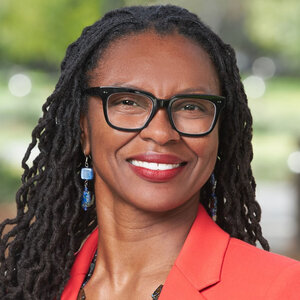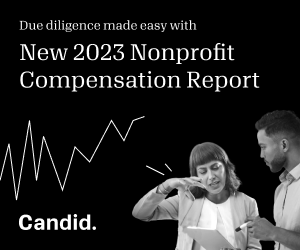Funding Black-led and Black-benefiting organizations is a racial justice imperative

Following the murders of George Floyd and Breonna Taylor in 2020, foundations around the country pledged an estimated $3.4 billion in investments to racial justice issues. Many people refer to this time as America’s “racial reckoning,” and yet we’ve seen no real reckoning with the question of how much of these philanthropic dollars actually reached grassroots, Black-led and Black-benefiting nonprofit organizations. A new report from my organization, Young, Black & Giving Back Institute, suggests an answer: not nearly enough.
Research regularly shows that Black-led nonprofits receive significantly less from philanthropy than our white-led counterparts. These disparities in funding mean that Black-led and -benefiting groups that are close to the affected communities do not have the resources they need to serve those communities as effectively as they could. Our report, supported by the Nielsen Foundation through its Data for Good grant program, found that, out of 200-plus representatives of Black-led groups, six in 10 agreed that funders never or rarely create funding opportunities specifically reaching Black-led, Black-serving organizations like theirs. Almost nine out of 10 (86 percent) said they always or often have trouble accessing a diverse number of funding sources to keep their organizations afloat.
As a founding executive director of a Black-led and Black-benefiting nonprofit, I am not surprised by these findings. Next year will mark the 10-year anniversary of the Young, Black & Giving Back Institute, which we created in 2014 to help close the gap in funding and capacity-building support for Black-led, Black-serving nonprofits. Throughout the past decade, I have managed volunteer-based teams as small as one person and as large as 10. No one has ever taken a salary, not even me, for two reasons. First, we could not afford it. And second, we’ve been intent from the start on running a lean program focused on maximizing results for the community we serve.
Our survey shows that our organization is not alone in facing these challenges. Forty-four percent of the Black-led, Black-serving groups we talked to operate without any paid, full-time staff. More than three in four (77 percent) operate on budgets under $500,000; one-third have budgets under $30,000. Also like our organization, almost three-fourths are led by their founders, and almost four in five are led by women, mostly Gen Xers and millennials.
Black-led and Black-serving groups we surveyed focus primarily on addressing the direct needs of Black communities, working on issues from poverty and health to education and workforce development. In short, these groups are a microcosm of the larger community of Black-led, Black-serving nonprofits in the United States—and their experiences and their stories underscore some clear calls to action for funders who are interested in racial justice.
First, foundations need to create more funding streams specifically for Black-led nonprofits serving Black communities. That means long-term, multiyear grants that allow these groups to create lasting infrastructure for financial management, fundraising, communications, and more.
Second, philanthropy needs to do more to listen to Black-led nonprofits so funders understand their real needs. When you build authentic relationships with these groups and their leaders, you can tailor your grantmaking more effectively, while providing technical assistance and other non-financial forms of support that enable these organizations to grow in their aspirations and impact.
Third, philanthropy needs to do better at understanding the systemic issues facing Black communities, including poverty, as well as the unique assets that keep our communities together, such as informal networking and Black church support. When funders have a stronger grasp of what’s happening in Black communities, they are more likely to provide the amounts and types of support that will help our communities thrive. Funders should also support the full scope of approaches needed—policy, direct services, organizing, leadership development—in order to build a robust ecosystem of support for Black communities.
Throughout my years at the Young, Black & Giving Back Institute, when we’ve operated with less than $25,000 in operations funds, and even now with a budget just over $90,000, I have been determined to run operations in ways that felt like we had $1 million. When we host in-person trainings, we strive to provide a five-star experience for the groups we serve, and we have always found new ways to show gratitude and appreciation to volunteers, speakers, facilitators, and others through gifts, gift cards, and more. We do a lot with very little—and it is something we have in common with Black-led, Black-serving organizations across the country.
Imagine what we could do if we truly have access to the resources we need. August 28 marked the sixth Give 8/28, an annual event we initiated to promote financial giving for Black-led, Black benefiting nonprofits. If you and the foundation you work for truly believe in racial justice, there is no better time than right now to put your money where your mission is. Once and for all, it is time for philanthropy to heed the call to fund Black-led and Black-serving nonprofits in ways that deliver real and lasting results for our organizations and, most importantly, for the communities we serve.
Ebonie Johnson Cooper is founder and executive director of the Young, Black & Giving Back Institute.








How to power shift in philanthropy: Lessons from The Share Fund’s radical approach to participatory grantmaking